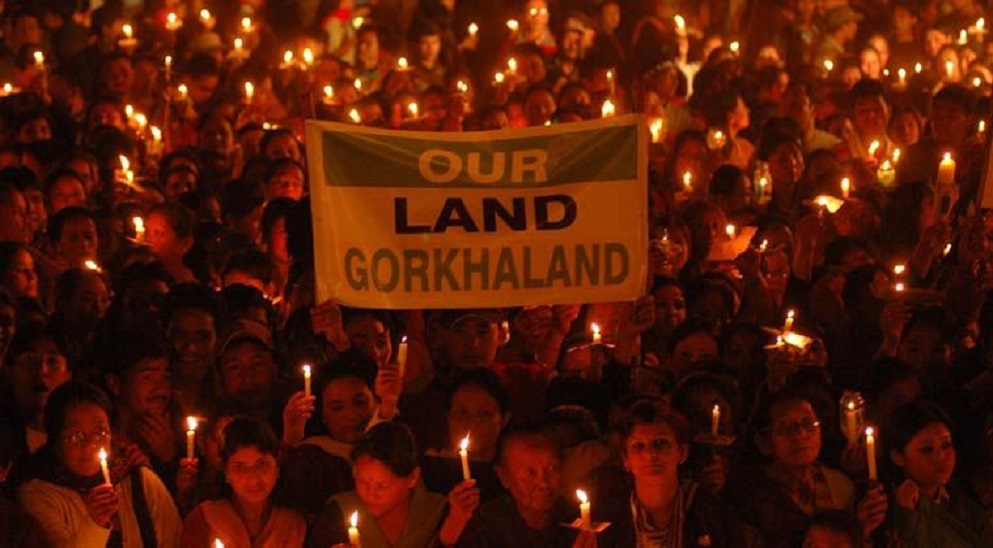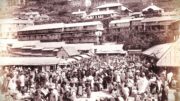Tourist season in the summer of 2017 started with a bang in Darjeeling and the nearby hill destinations. In Mirik where I stay small groups started arriving not just from nearby Siliguri and Kolkata but from far off Mumbai, Ahmedabad, Delhi and Jodhpur in early March. By late April these grew into noticeable crowds and by the beginning of May, almost all hotels had got full bookings until the end of June. Hoteliers, shopkeepers, hawkers and cabbies were all beaming with joy at the prospects of good income after a long spell of depression. Even those unconnected with tourism having nothing to gain or lose from increase or fall in the number of tourists were visibly happy in keeping with the Gorkha characteristic of effortlessly sharing joy or sorrows of the others around.
On 20 May I was in Darjeeling for a visit to the Mahakal temple as it happens to be my little grandson’s birthday. I saw cars overloaded with tourists crawling bumper to bumper. All hotels seemed full and those coming without prior booking could be seen beseeching the drivers and passersby to find some place at whatever cost. Walking from Capitol Mall to chowrasta was difficult because of the crowds rubbing shoulders. I couldn’t pick up my favourite cookies and pastries from Glen’s or the Kalimpong cheese from Kev’s as they had run out of stock by due to brisk sale to the overflowing tourists.
On the way back to Mirik I dropped in at a homestay facility run by an old acquaintance, an ex-army man near Gopaldhara Tea Estate. He had the facility full and advance booking for the entire month of June but surprisingly wasn’t as exuberant as the hoteliers, shopkeepers, hawkers and cabbies in Mirik or Darjeeling. Army men – serving or ex – are not the ones to be carried away easily. They always look beyond their nose, never give up their well-cultivated habit of scratching the surface to see what lies beneath and sniffing what future might hold in store.
“I do have the advance booking for my homestay for the whole of June, sir but”, he added cautiously, “I am not sure how things’ll move because of what didi has said the other day about the Bengali language to be made compulsory in our schools”. My friend was referring to Mamta Banerjee’s statement five days earlier on 15th May followed by her education minister Partho Chatterjee the next day that her government was going to make the Bengali language compulsory in all schools in the state. Neither of them bothered to clarify that ‘all schools’ won’t include the schools in the Darjeeling hills where the Nepali language enjoys precedence over Bengali. The West Bengal Official language Act of 1961 grants the status of official language to Nepali in the ‘three hill sub divisions, namely, Darjeeling, Kurseong and Kalimpong of district Darjeeling’. Nepali is virtually the lingua franca of the region and overwhelming majority of children in far-flung areas of the District attend schools where medium of instruction is Nepali and not Bengali.
My friend feared that the statements unless withdrawn with a solemn assurance by Ms Banerjee that no such move shall ever be contemplated in future might bring back the turbulence of 2007 and 2013 and may be even the horrors of the 1980s. His fears were not wholly unfounded as in a little over two weeks, by 8th June the picture had started reversing. By 15th June peace had given way to chaos, tranquility to turbulence and hordes of tourists had been replaced by squads of heavily armed constabulary patrolling every nook and corner of every town and hamlet in the hills.
I witnessed from ground zero as it were this harrowing process of steep descent with unbelievable rapidity. Why it happened so drastically, why the situation deteriorated so rapidly, could the slide down have been averted, if yes who are the ones who could have averted but didn’t, who are the villains of the peace who instead of dousing the flames added fuel to fire are some of the questions that have been bothering me and many others in the region. I tried to find answers to some of the question based on my first-hand observations, objective analysis and unbiased reasoning as far as humanly possible.
Why it happened? The triggering point for the calamity undoubtedly was an absolutely unwarranted declaration by Ms Mamta Banerjee about Bengali language being made compulsory in the schools and repetition of the same by Mr Partho Chatterjee. The statement reported widely in the print and electronic media was unequivocal, blunt and curt leaving no doubt in anyone’s mind that the intention was to impose the Bengali language in schools throughout the state with no exception for schools in the Darjeeling hills thereby violating the language policy followed in the region’s schools up till now. Public figures of the stature of Ms Banerjee and her education minister ought to have anticipated the massive resentment and devastating consequences their statements could lead to.
The sequence of events that followed reinforces the assumption that the widespread disturbances would not have occurred but for this initial spark and failure to contain the resentment in its early stage. After the statement was made by Ms Banerjee on 15th May and reiterated by Mr Partho Chatterjee on 16th May there were some small murmurs of protests from students and teachers confined to their respective campuses. No efforts were apparently made to contain it. Probably the intelligence set up of both New Delhi and Kolkata failed to pick up the whispers and alert higher-ups.
Noticeable signs of resentment beyond premises of schools and colleges appeared for the first time on 30 May when the GTA chief Bimal Gurung called a meeting of prominent academicians and literary figures ‘to discuss measures to be taken against the imposition of Bengali language in the hills’. The meeting was attended among others by Jiwan Namdung and Prem Pradhan, both former Presidents of Nepali Sahitya Academy and Rev. Joy Halder Rector of Darjeeling’s internationally renowned St. Paul’s School. Decisions reportedly taken at the meeting were to observe strike in the schools on 1st and 2nd June and to wear black badges and hold protest rallies during the CM’s proposed visit to Darjeeling from 4th to 8th June. Two days later on 1 June Rajen Mukhiia heading Mamta Banerjee’s very own TMC in the hills surprised his party bosses by expressing his opposition to what his party supremo and CM had announced. Not to be left behind each and every political outfit in the region followed suit some of them seizing the opportunity to emphasise the demand for Gorkhaland arguing that this was the only way to square up to such existential threats to the long-neglected question of Gorkha identity. This was the first definite indication that the resentment had reached wider political arena far beyond the confines of campuses and it could well nigh be already too late to prevent disruption of normalcy.
Regrettably, no efforts were made by the CM or any of her political lieutenants to stem the tide. On the contrary Rabindranath Ghosh Mamta Banerjee’s minister for Uttar Bango Unnayan (North Bengal development) when asked about the simmering discontent responded rather cavalierly, ‘people will go to Mamta Banerjee for their betterment’. It is only on 5 June that Mamta Banerjee addressing a gathering in Mirik declared that her intention was not to make the Bengali language compulsory in the hills but to keep it as an optional subject. (An optional subject it already was). But it appeared too late and the damage had already been done as a rat race for political point scoring had already started. What followed thereafter was an uncontrollable roller coaster slide down towards a bottomless pit marked by a series of protest rallies, dharnas, allegations and counter allegations of violence by the protestors and state establishment against each other culminating in an ill conceived declaration of indefinite bandh on behalf of the GJMM by Binay Tamang the present head of the newly constituted board of administrators for GTA.
Did anyone try to avert the situation from turning so calamitous? Yes, two persons, Darjeeling’s young District Magistrate Joysi Dasgupta and Superintendent of Police Amit Javalagi did try but their efforts were negated probably by the higher-ups. On 31 May when things had not yet spiralled out of control Joysi Dasgupta tried to convey through the local press that there could be no proposition to impose the Bengali language as there is no such official notification. This was a commendable initiative that could save the situation but its impact was completely washed away the same evening when regional Bengali TV channels showed the CM interacting with some schools heads in Kolkata repeating what she had stated on the 15th of May.
The district police chief Amit Javalagi too took a positive step by stating before the press on the same day that ‘there was always space for democratic protests’. I can vouch on the basis of my personal interaction with a cross-section of teachers, students and even politicians that his statement went a long way to mollify the frayed tempers and could nip the ensuing disaster in the bud if acted upon earnestly. Javalgi’s efforts too were wasted as he was shunted out of Darjeeling and one of his subordinates, the officer in charge of Darjeeling’s Sadar police station registered a suo motu FIR against Bimal Gurung and some leading academicians and literary figures invoking some of the most stringent provisions of penal code relating to criminal conspiracy, attempt to create enmity between sections of people and common intent to commit the crime. The action went against the spirit of what Javalagi had stated to the press for which perhaps he was punished with an abrupt posting out of the district.
Are there individuals or organisations who instead of dousing the flames added fuel to fire? Well, there are many and most of them happen to be the politicians in power. After the initial sparks flew from the CM’s statement on 15th May followed by her education minister on the 16th there was no sign of an upsurge for good two weeks right up to 30th May. Had the initial undercurrents been noticed and the CM stated earlier what she stated in Mirik on 5th June normalcy would have sustained. After all the common people were not interested in inviting disturbances at a time when the dividends from a boom in tourist inflow were just about ready to be harvested.
Why were the politicians so hell-bent on playing spoilsport is baffling. After all who gained what from this crude disruption perhaps orchestrated most unscrupulously? The Bengali language was optional and not compulsory in schools in the hills prior to 15 May 2017 and it continues to be optional after this long spell of turmoil that resulted in unnecessary incarceration and torture of many innocent men, women and children and the tragic loss of over a dozen lives including a young police officer in line of duty.
Why did Mamta Banerjee say on 15 May 2017 that the Bengali language shall be compulsory in schools throughout Bengal without specifying that there shall be an exception in case of schools in the hills because of the region’s distinct linguistic identity duly acknowledged in the state’s official language act of 1961? Why did Partho Chatterjee say on 16 May 2017 that ‘from now onwards it will be mandatory for students to learn Bengali in schools’ without pointing out that an exception shall always be there for schools in the hills? Why was an FIR registered against prominent personalities of the region for calling and attending a meeting to discuss measures to be taken against the imposition of Bengali language in the hills even as the district head of police was going on record that there is always space for democratic protests? School education is a subject transferred to the GTA? That being the case is it not just a democratic right but also an official prerogative of the GTA chief to discuss measures against such a major policy decision taken unilaterally by the CM directly concerning education affecting students within the GTA’s jurisdiction? Should such a legitimate exercise of a prerogative of office be criminalised? Why our MP upon whom we pinned hopes of support in times of distress failed to turn up during the crisis and kept mum even as our youngsters were falling to bullets for no visible fault of theirs? Were the acts of omission and commission by the ruling politicians result of sheer political naïveté or some malicious design? These are some of the unanswered or inadequately answered questions leaving us in distress as 2017 nears its end. Let us hope 2018 heralds dawn of better times, brings answers and does not bring similar questions all over again.
Writes: N N Ojha






Leave a comment